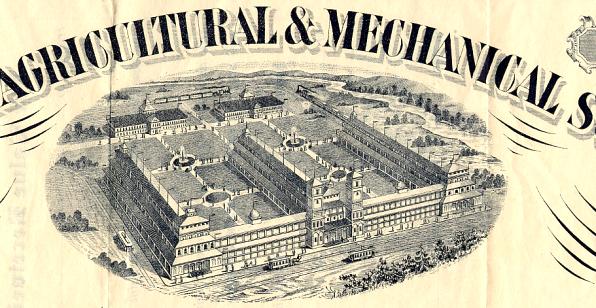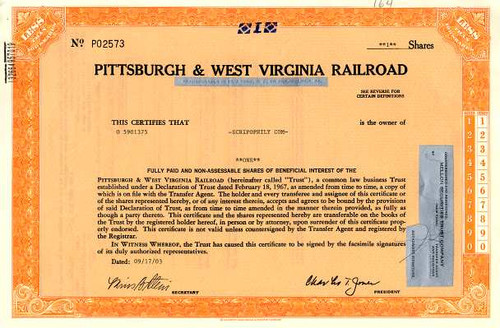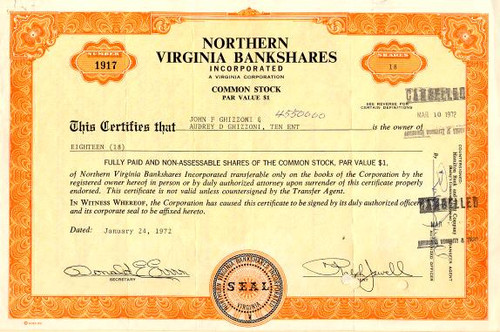Beautifully engraved certificate from the Virginia Agricultural & Mechanical Society issued in 1888. This historic document was printed by A. Hoen & Co, Richmond, Va and has an ornate border around it with a vignette of the Virginia Agricultural Society. This item has the signatures of the Company's President, Ashton Starke and Secretary, Andrew Reid Venable, and is over 129 years old 
Certificate Vignette The Virginia Agricultural and Mechanical College began its first academic session on October 1, 1872. The first student to appear, William A. Caldwell, from Craig County, was given a state scholarship by the faculty and was enrolled as the first student. On March 5, 1896 the school changed it's name to Virginia Agricultural and Mechanical College and Polytechnic Institute. The change reflected the development of the college into a school with a strong interest in science and technology, as well as maintaining its traditional ties to the studies of agriculture and engineering. For popular usage, the long name was shortened to Virginia Polytechnic Institute , or V.P.I. In 1944, the words Agricultural and Mechanical College were dropped from the school's name. Virginia Polytechnic Institute, which is what the school had been commonly called since 1896, now became the official title. In 1970, after a period of spectacular growth the school's name was changed once again. It became Virginia Polytechnic Institute and State University, a.k.a. Virginia Tech.
Ashton Starke was featured in the Richmond Dispatch in 1904 as one of the "Makers of Richmond." The article describes an affable man, well-liked and well-regarded by his peers in civic and social circles, who stood "something less than six feet six inches in height." Starke made his money in the agricultural implements business, and was president of the successful Virginia Agricultural Exposition at the "new" fairgrounds in 1888. As a former president of the Commonwealth Club, Starke would have been socially associated with many of his neighbors, including Lewis Ginter.
Andrew Reid Venable was born 2 December 1832 at Vineyard in Prince Edward County, Virginia, to Samuel Woodson Venable (1797-1855) and Jane Reid Venable. He graduated from Hampden-Sydney in 1852 and travelled west. Venable settled in St. Louis, Missouri, and became a successful businessman. There he met an army officer named Jeb Stuart (1833-1864) and the two became good friends. He also met Adeline Hackney Stevens, niece of the governor of Maryland and his future wife. When the Civil War began, Venable returned to Virginia and joined the Richmond Howitzers, serving in action. In the summer of 1862, he was appointed captain and assistant commissary of subsistence for the 1st Regiment, Virginia Artillery. After the battle of Chancellorsville, Venable was promoted to major and transferred to Stuart's staff as assistant adjutant and inspector-general of the cavalry corps. He served on Stuart's staff until the latter's death 11 May 1864. Venable then served on the staff of General Wade Hampton who succeeded Stuart commanding the cavalry corps. Venable was captured at the battle of Hatcher's Run 27 October 1864. Being transferred from Old Capitol prison in Washington D.C. to Fort Delaware, Venable made his escape near Philadelphia, Pennsylvania. Southern sympathizers in Philadelphia hid him. Adeline Stevens met him in Philadelphia, and the two were married. Venable returned south and served until the end of the war. After the war, he returned to Prince Edward County and farmed. He and his wife had six children. Venable died 15 October 1909 at Millwood in Prince Edward County. Andrew Reid Venable (18321909), former member of J. E. B. Stuart's staff Major Andrew Reid Venable, rode the mile and a half to Beaver Dam. There, Stuart met his wife, Flora, who assured him that everyone was safe. Not taking the time to dismount, Stuart exchanged a few words with Flora from the saddle, then kissed her goodbye and left to rejoin his men. During the ride back, the usually ebullient Stuart was at first Silent, and then told Venable that he had never expected to survive the war--a remark he usually made in jest, but this time with a certain seriousness. Stuart added that he would not want to live if the Confederacy lost the war. 10-15-1909 Andrew Reid Venable, Inspector-General for J.E.B. Stuart, commission merchant, died

Certificate Vignette
Ashton Starke was featured in the Richmond Dispatch in 1904 as one of the "Makers of Richmond." The article describes an affable man, well-liked and well-regarded by his peers in civic and social circles, who stood "something less than six feet six inches in height." Starke made his money in the agricultural implements business, and was president of the successful Virginia Agricultural Exposition at the "new" fairgrounds in 1888. As a former president of the Commonwealth Club, Starke would have been socially associated with many of his neighbors, including Lewis Ginter.
Andrew Reid Venable was born 2 December 1832 at Vineyard in Prince Edward County, Virginia, to Samuel Woodson Venable (1797-1855) and Jane Reid Venable. He graduated from Hampden-Sydney in 1852 and travelled west. Venable settled in St. Louis, Missouri, and became a successful businessman. There he met an army officer named Jeb Stuart (1833-1864) and the two became good friends. He also met Adeline Hackney Stevens, niece of the governor of Maryland and his future wife. When the Civil War began, Venable returned to Virginia and joined the Richmond Howitzers, serving in action. In the summer of 1862, he was appointed captain and assistant commissary of subsistence for the 1st Regiment, Virginia Artillery. After the battle of Chancellorsville, Venable was promoted to major and transferred to Stuart's staff as assistant adjutant and inspector-general of the cavalry corps. He served on Stuart's staff until the latter's death 11 May 1864. Venable then served on the staff of General Wade Hampton who succeeded Stuart commanding the cavalry corps. Venable was captured at the battle of Hatcher's Run 27 October 1864. Being transferred from Old Capitol prison in Washington D.C. to Fort Delaware, Venable made his escape near Philadelphia, Pennsylvania. Southern sympathizers in Philadelphia hid him. Adeline Stevens met him in Philadelphia, and the two were married. Venable returned south and served until the end of the war. After the war, he returned to Prince Edward County and farmed. He and his wife had six children. Venable died 15 October 1909 at Millwood in Prince Edward County. Andrew Reid Venable (18321909), former member of J. E. B. Stuart's staff Major Andrew Reid Venable, rode the mile and a half to Beaver Dam. There, Stuart met his wife, Flora, who assured him that everyone was safe. Not taking the time to dismount, Stuart exchanged a few words with Flora from the saddle, then kissed her goodbye and left to rejoin his men. During the ride back, the usually ebullient Stuart was at first Silent, and then told Venable that he had never expected to survive the war--a remark he usually made in jest, but this time with a certain seriousness. Stuart added that he would not want to live if the Confederacy lost the war. 10-15-1909 Andrew Reid Venable, Inspector-General for J.E.B. Stuart, commission merchant, died







